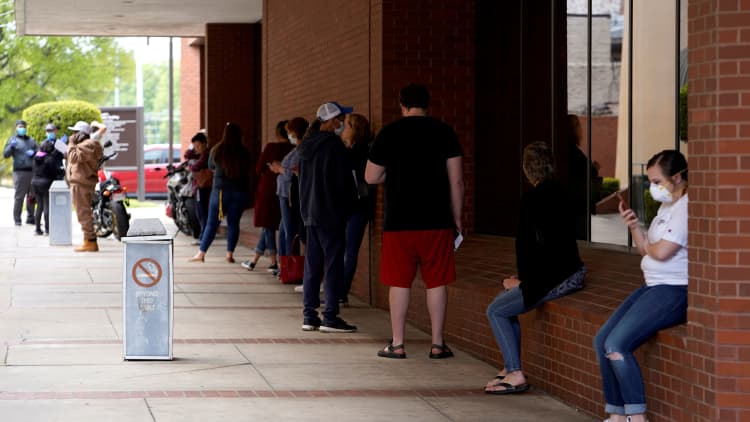States paid a record $48 billion in unemployment benefits last month as the coronavirus pandemic caused millions of Americans to lose their jobs.
But the payout could have been much larger — about double — were it not for administrative delays among states, according to an analysis from researchers at the Brookings Institution.
"A lot of money is going out," said Jay Shambaugh, director of the Hamilton Project, an economic initiative within the left-leaning think tank, and one of the authors of the report. "But it's nowhere near how much could be going out."
The $2.2 trillion federal coronavirus relief package enacted in late March enhanced unemployment benefits for jobless Americans.
It did so in three primary ways: by raising weekly pay, increasing its duration and extending benefits to previously ineligible groups like the self-employed.
Surge in unemployment benefits
These enhancements, when combined with unemployment levels not seen since the Great Depression, led to a surge in total unemployment pay in April.
States and the federal government paid $48.4 billion in total unemployment benefits in April, according to Treasury Department statistics.
The data are the first concrete signal of the scope of unemployment aid that reached Americans last month amid the economic downturn, Shambaugh said.
We won't have a clear picture of how many Americans received the aid until the government releases additional numbers in a few weeks, he said.
More from Personal Finance:
How you can make money during the pandemic
How negative interest rates would affect your wallet
Some firms that took a PPP loan are about to get a break
The statistic is record-setting both in terms of total unemployment pay and for being the largest monthly increase in benefits on record. Unemployment payments were $3 billion in February and $4.2 billion in March, by comparison.
April's $48 billion payout was larger than during the first four months of 2009, the peak of the Great Recession, combined, Shambaugh said.
'Upward trajectory'

That's partly a function of unemployment benefits being more generous now and there being higher unemployment rates than during the last recession.
The relief law boosted jobless pay by $600 a week, in addition to benefits already provided by states. That increase accounted for more than half — or $27 billion — of the spending in April, according to the Brookings analysis, published Wednesday.
The unemployment rate also hit 14.7% in April, according to the Bureau of Labor Statistics. By comparison, the Great Recession saw unemployment levels approaching 10%.
More than 36 million people have filed for unemployment benefits over the past two months.
May's total unemployment payout could be much larger.
"We're still on an upward trajectory," Shambaugh said. "There's every indication we'll put out a lot more money in May than in April."
That's partly a function of state unemployment systems not being fully equipped to process applications from newly eligible groups such as the self-employed in April. Many more people who should be getting paid by states will begin to receive aid, Shambaugh said.
The average American can expect about $978 a week in unemployment benefits, when factoring in both new federal aid and pre-pandemic state payouts.
The $48 billion payout offset about half of lost private-sector wages and salaries in April, Brookings estimates.
Could have been larger
Total benefits paid in April would have been roughly $80 billion if it weren't for administrative lags and other snags in the unemployment system that caused workers eligible for benefits to receive delayed funds, according to the Brookings analysis.
It would have exceeded $90 billion — roughly double what was actually paid — if the total 23.1 million Americans who were counted as unemployed received benefits, the analysis found.
This analysis is a ballpark estimate and is likely a bit inflated, since it assumes all unemployed workers are eligible for benefits, Shambaugh said.
"Despite all the complaints — which are large, many and all justified — about the challenges of getting on unemployment insurance, it's shocking to me, despite all those complaints, how much money got pushed out through the system," Shambaugh said.
"It shows how crucial the unemployment insurance system has been," he added. "But it's failing to get money to a lot of people."


